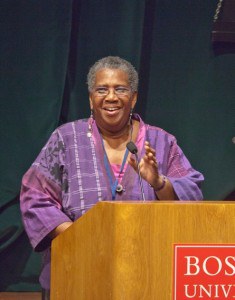Our Bodies Ourselves at Forty

OBOS celebrates its 40th birthday this year, and members of what is now a worldwide community gathered in Boston to discuss the book's huge impact for women globally.
It began in 1969 when 12 women met during a women’s liberation conference in Boston. A workshop on “women and their bodies” provided an opportunity for the women to talk about their own bodies and their experiences with doctors. Sharing this information led them to form the Doctor’s Group—forerunner to the Boston Women's Health Book Collective—to research and discuss what they were learning about themselves, their bodies, health, and women.
The discussions and research turned into a course booklet entitled Women and Their Bodies, a stapled newsprint edition published in 1970. The booklet, which put women’s health into a radically new political and social context, became an underground success. In 1973 Simon & Schuster published an expanded edition, renamed Our Bodies, Ourselves. The rest, as they say, is herstory.
On October 1, the ninth edition of OBOS was released coinciding with the 40th anniversary of the collective, now known also as Our Bodies Ourselves. In celebration of the anniversary as well as the new edition of OBOS and more importantly, its impact around the world, a global symposium—Our Bodies, Our Future: Advancing Health and Human Rights for Women and Girls—was held in Boston.
In the program notes, OBOS co-founder Sally Whelan wrote, “We’ve come a long way from our origin as a Boston-based collective talking around the kitchen table, to a thriving global presence with a place ‘at the table’—alongside other powerbrokers—in countries around the world.” Others joined with her in proclaiming that OBOS is more than a book; it’s a tool for social change in which human rights is the framework.
Twelve women who came from countries as diverse as Senegal, Israel, Turkey, Bulgaria, Nepal, and Chile to talk about their experiences in adapting OBOS agreed heartily. Representing the 22 partners who have joined the Our Bodies Ourselves Global Initiative (OBOGI) launched in 2001, they are part of a network of activists dedicated to providing evidence-based, culturally appropriate information on health and sexuality to women and girls in countries around the world.
Miho Ogino, a professor of gender history and queer studies in Kyoto, Japan edited the Japanese OBOS in 1988. Recalling that 50 women met in a women’s bookstore to work on the translation, she said, “Japan was an especially male centered society at that time. Women were not considered in control of their own bodies and they had a sense of shame and fear. Ignorance about their bodies was seen as a virtue.”
One of the challenges Ogino and the other Japanese translators faced was the need to invent language to replace expressions that treated women’s bodies negatively. For example, the term “shame hair” became “sexual hair” and menstruation, which had implied pollution, was named “a monthly occurrence.” Some of the invented words eventually made it into Japanese dictionaries, revealing the project’s influence.
In Japan, Ogino says, OBOS had three distinct impacts: It offered a life-changing experience by helping women to see their own bodies more positively (disability activists were thrilled to see their sexuality discussed); it provided inspiration for other groups and activities, changing the atmosphere so that women could talk openly about their bodies and their sexuality; and it led to positive changes by (some) medical professionals.
More recently, Women and Their Bodies, based on OBOS, has just been published in Israel in Arabic and Hebrew. Working collaboratively, more than 300 Palestinian and Jewish women developed the two books, which were released simultaneously in order to make a political statement. “As women, it’s not easy [in Israel] so it was a dream to come together to write these books,” Dana Weinberg said. “We had many challenges along the way but we worked together to find ways to put each other’s agendas on the table. Being a gender minority helped the process.”
In Senegal, where there is only one midwife for every 5,200 women and one doctor for every 15,000 people, the challenge of educating women and girls about their bodies and helping them to feel comfortable with their sexuality is compounded by a rise of religious fundamentalism. “Women must address power relations and sexuality in a difficult cultural context,” according to Codou Bop, an activist with Groupe de Recherche sur les Femmes et les Lois au Senegal. “Doctors despise women, especially poor women, so it is very important to bring information to young women at the local level who want human rights to be applied to health and sexuality.” Religious fundamentalism, Bop says, has spawned increased violence against women that is now justified by religion as well as culture.
The political nature and impact of OBOS has become undeniable. In addition to translations of the book into more than 25 languages and the development of multilingual websites, networks have been built, training materials developed, workshops held. “OBOS is one of the most subversive books out there,” claims Loretta Ross, co-founder and National Coordinator of the SisterSong Women of Color Reproductive Justice Collective. “It talks about a whole range of issues we don’t usually think of as ‘health issues.’ I’m thrilled by the use of the human rights framework and I’m impressed that racial, reproductive, and economic state violence are being recognized and connected.”
Still, warns Byllye Avery, founder of the Black Women’s Health Imperative, “we can’t be complacent. We must continue this work worldwide. As women activists we are a force to be reckoned with. We are the ones we’ve been waiting for!”
More articles by Category: Feminism, Health, International
More articles by Tag:



























